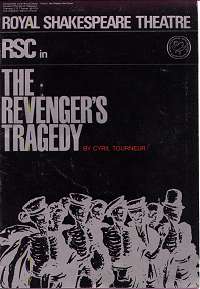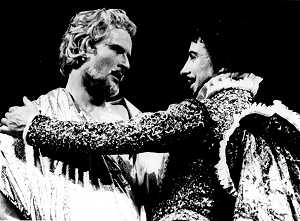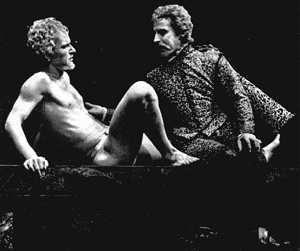
Production Information
Review / The Stage / 13.10.66
Review / Plays and Players / December 1966 (below)
Review / Birmingham Post / 28.11.69
Review / The Listener / 4.12.69
Review / The Observer / 9.10.66
 |
Production Information Review / The Stage / 13.10.66 Review / Plays and Players / December 1966 (below) Review / Birmingham Post / 28.11.69 Review / The Listener / 4.12.69 Review / The Observer / 9.10.66 |
|
In the Royal Shakespeare Company's superb de luxe programme for The Revenger's Tragedy a brief article on the RSC and subsidy explains that each play costs the company about £15,000 to stage. I wonder if this Tourneur production by Trevor Nunn, which arrived so late on in the Stratford season as to catch only eight performances, in fact came up to even this modest figure. In the rich sheen of its blacks, greys and silver it certainly looked a lavish affair - but I would guess that this is probably only a fortunate impression gained from a happy combination of the ingenuity of the designer, Christopher Morley, and of the skill of the company's workshops in conjuring up the pomp of yesteryear with the plastics and aluminium foil of here and now. |
 |
If this is so, the production team would seem to have met the challenge of its budget with even more satisfying results than Clifford Williams' unexpected triumph a few seasons ago with an inexpensive Comedy of Errors. At the time of writing no announcement has been made for the transfer of the Tourneur, so this notice must in part read as another voice raised in the undoubtedly large chorus entreating the play's revival at Stratford or in London - preferably both.
Until the Pitlochry Festival Theatre 1965 production, The Revenger's Tragedy enjoyed an ever increasing reputation in literary circles which could only be substantiated in the theatre by well-intentioned but over-taxed undergraduate and amateur revivals. The truth is that few plays stand in greater need of the technical precision of the professional player. It is not just that Tourneur's grisly brew of lust, incest, fratricide, rape, adultery and general blood-letting requires first class playing if it is not to seem what William Archer dubbed 'a mere farrago of sanguinary absurdities'. It is that Tourneur (if indeed he was the author) is parodying the very Revenge tradition that his play epitomises and consequently exceedingly fast and accurate playing is demanded if the audience is to understand that when they do hoot at the bloody goings-on, it's not because a clever young director is sending up a ridiculous old play. It is because a clever young writer had taken the Hamlet-like format and turned its revenge activities inside out to offer a glimpse of humanity in a style which finds its present-day expression in the drawings of Gerald Scarfe.
With The Revenger's Tragedy Trevor Nunn was consequently treading on a minefield of a text that constantly threatened to explode in his face but which, in Stratford at least, it never did. No doubt the play's reception was helped by recent changing trends in humour which have resulted in even mass media entertainment abandoning comfortable and cosy laughter in favour of a sharper, more chilling and frequently grotesque vein which, like The Revenger's Tragedy, often has an ultimately didactic and moral purpose. Still, even if the current climate is favourable, the play would not have come up so well if the cast had been less than excellent.
Ian Richardson, who plays Vendici, the revenger whose tragedy it is that he comes to enjoy the life he first abhorred, is given his biggest opportunity yet to justify the many promises of his six-year stay with the company. I thought he began the evening too much in the Scofield vein as though he had adopted some of that actor's inflexions without sufficiently refashioning them to his own needs. But he soon got into his stride and showed that he had all the fire, the agility and sheer elan to walk away with this mercurial monster who not only follows Hamlet in reproaching his mother with her weaknesses but also sets about corrupting her too. Patience Collier has all the guns for this turncoat of a part and is as good in her cynical preparations to market her daughter's virginity as in her later frenzied entreaties to undo her folly.
The court grotesques are also in capable hands. David Waller is the Duke, an ageing lecher with an appropriate elder statesman veneer. Brenda Bruce is the Duchess, a well preserved matron hell-bent on seducing her husband's bastard son. He is played with jaunty verve by Norman Rodway, whose jocular reaction to the sight of his father's corpse is immortalised in the query, 'Old Dad dead?'
Although the Duchess's three sons (rejoicing in the names of Ambitioso, Supervacuo and Junior) are ably caricatured by Terence Hardiman, John Kane and Christopher Bidmead, the outstanding court performance comes from Alan Howard as the Duke's son, Lussorioso. An airy, blond popinjay, the character is nonetheless sufficiently rooted in reality to occasion the audience a shiver as well as a smirk. Mr Howard in fact does a brilliant job in steering clear both of caricature and self-congratulatory villainy.
|
As far as the staging is concerned, the greatest challenge is probably the floor show with which the drama concludes. A macabre dance of death put on to entertain a degenerate court at supper, it presents in the end an even more bloody slaughterhouse than Fortinbras met up with in Elsinore. It is very much to the director's credit that the production does not here tail off into lame pantomime. In fact it triumphantly concludes a triumphant evening which should be seen elsewhere if only to ensure that Jacobean drama continues to enjoy attention in the theatre which it has for so long been given in the study. Peter Roberts. Plays and Players, December 1966. |
 |